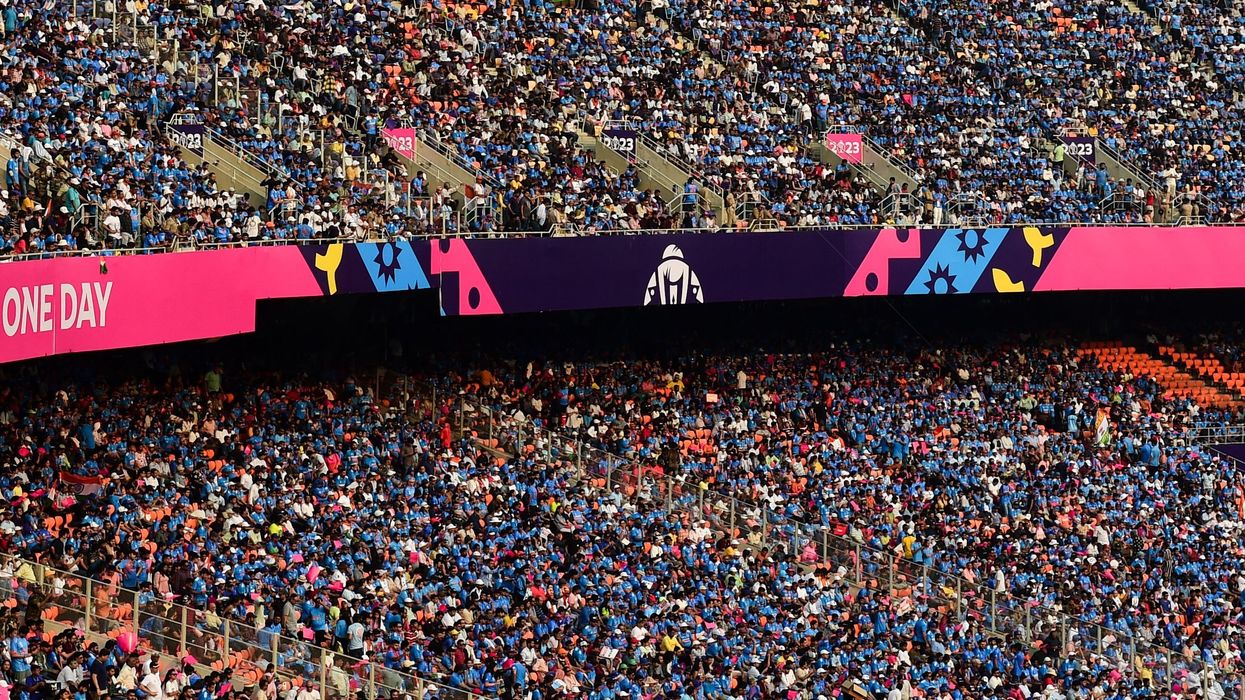INDIA’S competence to stage the Olympics, which prime minister Narendra Modi wants to do, has been questioned by Simon Wilde, cricket correspondent of The Times, who has written a blistering article about the alleged mismanagement of the World Cup currently under way.
Wilde took the Board of Control for Cricket in India to task: “The most alarming thing is that those who are running the tournament – the BCCI, rather than the International Cricket Council, even though it is officially an ICC event – genuinely do not seem to care. Given that the BCCI has close links to the government here, and India is planning a bid to stage the 2036 Olympic Games, it really should be taking a broader view.”
Modi is keen to attract the Olympics to reflect the power of rising India.
India is interested in hosting the global games in 2036, Modi said earlier this month at the opening ceremony of the International Olympic Committee (IOC) session in Mumbai.
The country has never hosted the Olympics before, but in 2010 Delhi hosted the Commonwealth Games.
“India will leave no stone unturned in our efforts to organise the Olympics in India in 2036,” the prime declared. “This is the age-old dream of 140 crore (1.4 billion) Indians, it is their aspiration. We want to realise this dream with your collaboration and support... I am confident that India will get the support of the IOC.”
India is among several nations eyeing future games, with Paris set to host the 2024 summer Olympics and Los Angeles picked for the 2028 games. Brisbane, Australia, will stage the 2032 Olympics.
Wilde also slammed the one-sided nature of the crowd for the India-Pakistan game at the Narendra Modi stadium in Ahmedabad on October 14.

“Any tournament host should be willing to accept the citizens of a participating country,” he said. “The hostility towards Pakistan fans and journalists has been well documented. At the last count about a dozen Pakistan journalists had finally been granted visas and allowed in; that figure is expected to rise, but for heaven’s sake we are entering the third week of the tournament.”
He said the comments made by the South African-born Pakistan coach Mickey Arthur that the match “felt like a BCCI event rather than an ICC event, was a stinging rebuke of the shamefully lopsided nature of the experience. Has any sporting event watched by 100,000-plus people seen such a disparity in numbers between the supporters of one side and the other?”
India easily won the match. Other cricket writers appear to agree with Wilde.
Another cricket correspondent from abroad, who said he was enjoying the experience of being in India, told Eastern Eye: “I think what Simon writes is fair: it certainly tallies with my experience.
The BCCI don’t care about the fans, which is very sad.”
And Ashis Ray, who has updated his book, Cricket World Cup: The Indian Challenge, published by Bloomsbury, also said: “I entirely agree with Simon. In fact, the situation is worse. The India-Pakistan match at Ahmedabad was a disgusting affair in terms of anti-Pakistan crowd behavior. The spectator comforts at the stadiums remain as shambolic as they used to be. Food, hygiene and toilet facilities are woeful. The ICC is responsible, for the Cricket World Cup is an ICC event.
The BCCI is meant to implement its teplate. If this is being ignored, the BCCI needs to be penalised.”
Wilde did say: “A definitive verdict must wait for the end of the tournament, but India’s hosting of the Cricket World Cup is looking like an enormous missed opportunity. The greatest cricketing territory in the world could have used the sport’s biggest global tournament to showcase the country as one of the most advanced societies of the 21st century and a market leader in event organising.
“In fact, it has appeared anything but. Many of us who have been coming here for more than 30 years think it feels like the same old, same old. What is delivered is delivered late (late schedule, late tickets, you name it), and as ever the little people – in this instance those who dare to come and watch a match in person rather than on television, which really is the only prism through which the BCCI can see the world – are treated with contempt.”
He contrasted what was happening in India with the management of the rugby world cup which involves several of the leading cricketing nations – among them, England, Australia, New Zealand and South Africa.
He pointed out that “sports fans in those places have been offered a stark contrast on their TVs: the sold-out stadiums in France, full of multinational audiences passionately supporting their teams, versus the soulless swathes of empty seats in cavernous concrete bowls around India. Which one looks better; which sport looks healthier?
“The cricket grounds here are not without their qualities, but their most impressive characteristic is their size, which in the minds of the Ozymandiases who run the state associations is of course all that matters. But look closer and you cannot escape the dirty seats and lack of basic amenities, such as food and drink outlets, that might be regarded as unacceptable to a 1990s audience, let alone one in the 2020s.”
Wilde argued: “It would not cost much to address these issues and, let’s be frank, the BCCI is the wealthiest cricket body in the world. It could easily make things better if it wanted to. It could also have released tickets earlier, or digitised the whole ticketing process, but holding on to tickets and distributing them as an instrument of patronage is the oldest trick in the Indian bureaucratic book.”
He acknowledged that “it would be a mistake to try to impose Western attitudes on subcontinental ways, but World Cups are only supposed to be awarded to those willing to meet certain criteria.
“It’s not just an issue of comfort, there’s also the safety aspect. A few days ago scaffolding and advertising fell off the top of a stand when high winds struck the stadium at Lucknow during the Australia-Sri Lanka match. Anecdotal evidence suggests the stadium in Guwahati that hosted England’s two warm-ups was not without its risks.
He noted the lack of foreign fans. “Less documented is the dearth of any foreign support at what should be a celebration of global cricketing excellence. The England team are now here in Mumbai, which is among the most attractive Indian cities to visit, yet their travelling support barely totals 200-250.

“ITC is one of three companies that has brought supporters, along with Gullivers and the Barmy Army. Gary Millis, its spokesman, has accompanied most England tours for the past eight years and says this has probably been the worst.”
Millis was quoted as saying: “The organisation hasn’t been brilliant. We weren’t given the locations until July, when February would have been better, and didn’t get the ticket prices until August. That’s had a major impact. We were already further down the line on sales for the Test matches in India early next year than we were with this World Cup, because the Test dates came out earlier.
“On the whole we’ve enjoyed the experience. The locals are really friendly. But the biggest let-down has been the grounds and not being allowed to take things in with us, except phones and wallets. We can’t take in phone chargers, water, food or suntan lotion, and many of the seats are not in the shade, so things like water and suntan lotion are important.
“They confiscate all sorts of items like sprays, sanitisers and gels. There’s a whole list of things you’re not allowed to take in. We were also told we could buy suntan lotion in the ground but couldn’t.
“There wasn’t any bottled water available in Delhi and we didn’t feel we could trust the water they provided because we were unsure where it had come from.
That was poor. At one of the venues we were asked to show our tickets six times after we entered the ground.
“I’ve been on plenty of England tours and none have been as strict as this. It’s terribly frustrating. I think they need to get in line with the rest of the world.”




